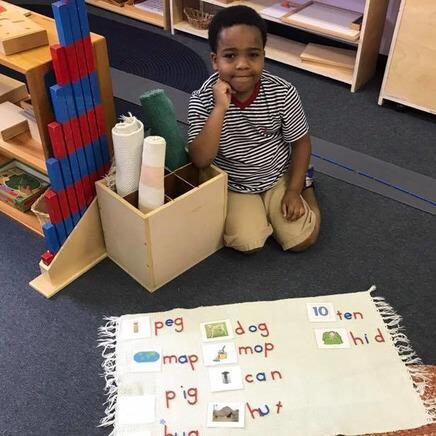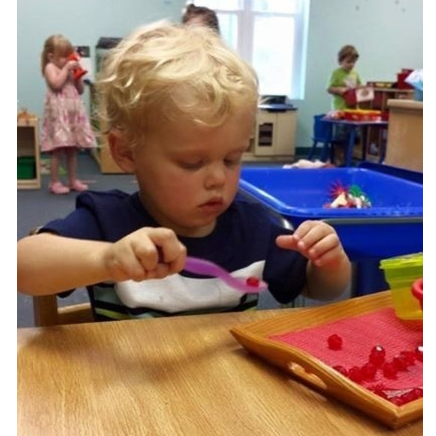Daycare Programs in Wilson, NC

The Montessori Method
The Montessori Method is beloved not only by the teachers, parents, and children of Building Blocks, but also by educations all over the world. A Montessori classroom is designed to develop a safe and positive classroom with self-correcting material and activities that encourage the development of social skills, emotional growth, concentration, physical coordination, and cognitive education. Students who receive a Montessori education are well prepared to succeed in kindergarten and beyond.

Montessori at Building Blocks
We incorporate aspects of the Montessori approach at every age level, but the curriculums of our Montessori 1, 2, and 3 classrooms, as well as our kindergarten program, are based upon Montessori methods. Through areas including Practical Life, Math, Language, Sensorial Experiences, Social Studies, and Science, children are able to explore their world in a concrete way. Additionally, the Montessori curriculum facilitates the development of soft skills, such as problem solving, cooperation, and concentration, and focuses on forming an enthusiasm for lifelong learning.
Curriculum Features
-
The Montessori Classroom
Dr. Montessori, the method’s founder, believed that the most important years of development are from birth to age 8, and because of that she centered her approach on creating a positive learning environment for children in this age group. At Building Blocks, each Montessori classroom is a specially prepared and unique environment where children are allowed to experience the excitement of learning based on their own choices.
-
Non-Competitive Environment
In our classrooms, children are free to work individually or with others. Activities are guided by respect for the teacher, the work of others, and the materials. By becoming absorbed in meaningful work, children are able to acquire self-discipline and guide their own learning. Teachers at Building Blocks motivate and guide each child on their own unique paths, and evaluate each child’s performance based on their past actions. This allows children to develop self-confidence, as they are only compared to themselves, not to their peers.
-
Sensorial Areas
In our sensorial areas, children explore differences in sizes, shapes, textures, sounds and smells. These activities, beyond developing senses, also start the preparation for reading and writing. For example, listening activities prepare children to perceive subtle differences in the sounds of letters, and geometric shapes help children concentrate on different shapes that will be necessary for letter recognition.
-
Language
From the sensorial explorations, children naturally progress to interest in Language and are introduced to sandpaper letters, metal insets, and the movable alphabet. Young children have a unique fascination for words, both printed and spoken. This fascination often enable them to read and write beyond the age at which it is traditionally taught.
-
Math
In the Math area, Dr. Montessori’s materials include items that are concrete and representative of all types of quantities. In a Montessori environment, children not only see the symbol 1, 1000, or ½, but can also hold each of the corresponding quantities in his hand. Later, by combining this equipment, separating, it, sharing it, counting it, and comparing it, children can demonstrate to themselves the basic operations of arithmetic. This activity, along with many others in the Math area, gives children the satisfaction of learning by discovery rather than being told.
